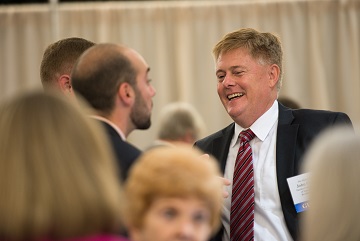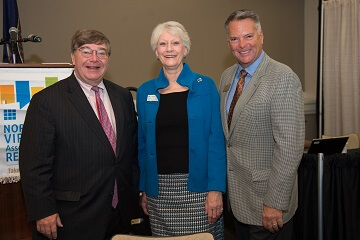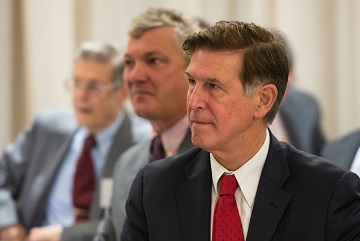‘Angry Outsiders’ and the Recovering Economy Are Shaping Messages From Both Sides
Is there an underlying logic behind the craziness of today's politics? Charlie Cook, editor and publisher of the Cook Political Report and analyst for the National Journal Group sought to analyze the forces that have caused the pathological government gridlock during NVAR’s annual Politics & Pancakes breakfast on October 13.
FIVE FORCES TO BE RECKONED WITH
Saying “elections are like fingerprints, all are different but some are more unusual than others,” Cook, whom the New York Times described as “one of the best political handicappers in the nation,” sought to predict the political landscape of our near future. Political parties, he said, don’t usually “commit suicide,” but five political forces are driving both parties toward the edge of the cliff.
Ideology. Moderates were the glue that held the system together, Cook explained, but now that politics has become so polarized, that glue has lost its grip. Democrats are now more liberal than they were under the Clinton Administration, while Republicans are far more conservative than they were under Bush, he said.
In order to win primaries, Cook noted, candidates have to appear tough and unyielding so moderates can’t survive to the actual election. Media also fuels the ideological rift, he added. Before the internet, everyone drew from the same news sources.
Now, he said, viewers choose the media that validates their ideological predilections.
Economic Anxiety. There's a widespread perception, Cook noted, that a majority of Americans have been left behind by the economic recovery and that upward mobility and economic opportunity are no longer realizable goals for them. He explained that this sense of insecurity is intensified by crises in the Greek and Chinese economies that reveal how vulnerable the U.S. economy remains.
Populism. The rise of protest groups such as the Occupy Movement and the Tea Party, combined with the emergence of oppositional public figures such as Bernie Sanders and Donald Trump, indicates that large numbers of Americans are rejecting politics as usual, he explained. Within the political parties, old alliances are breaking down. Business interests and traditional values advocates find themselves increasingly at odds in the Republican Party, Cook noted, while Democratic Party stalwarts such as environmentalists and unions often take opposing sides on key issues.



Culture Wars. The political goals of Democrats and Republicans are fundamentally different, Cook pointed out. The highest policy priorities of Republicans are national security, protection from terrorists and upholding America's place as number one in the world, Cook said. Democrats are more interested in jobs, social equality and environmental protection, he added.
The rift between the two parties has been widened by the emergence of a group that Cook terms “the angry, exotic wing of the Republican Party” or “the angry outsiders.” Barry Goldwater and George Wallace were the forerunners of this group, he explained.
Now, the angry outsiders are challenging the conventional Republicans for control of the Party. Cook noted that Ronald Reagan would not win an election today if he were to run with the positions he advocated in 1980.
Frustration With Government. Cook believes the anger at Washington and career politicians is concentrated on the Republican side. Republican politicians control Congress, yet they have made few of the changes they promised to their “rank and file,” he said.
Cook describes the angry outsider wing of the Republican Party as having a massive temper tantrum. Like most temper tantrums, this one, Cook believes, will eventually subside as radicals learn to compromise to achieve what is possible. At this point, however, they are, “declaring a Chapter 11 political bankruptcy.”
ELECTION PREDICTIONS
“It might be time for a change,” Cook warned, since there are “changing demographics. The country is changing.”
On the Democratic side, Cook believes that Hillary Clinton was seriously wounded by the e-mail scandal and embassy attack in Benghazi. Now her ratings among Independent voters have been seriously eroded and she needs them to win, he said. Cook doesn’t see Bernie Sanders as a serious candidate. Sanders is perceived as “a flake in a sideshow” by his colleagues in Congress, and so far only two members of Congress have endorsed him, Cook said.
Sanders, who would be 79-years old at the end of his first proposed term, calls himself a Democratic Socialist, which will not play well in the heartland, Cook theorized. Cook doesn’t see any of the other Democratic contenders as a serious threat to Hillary’s nomination.
On the Republican side, Cook identifies the full slate of Republican candidates as either conventional or unconventional. He says that Jeb Bush inherited “a badly damaged brand” from his brother and then added to his handicap by underperforming as a candidate. After Jeb Bush, Cook predicts that the second most likely candidate for the Party’s nomination will be Marco Rubio since he appeals to both Latinos and young voters. Chris Christie will have a hard time being a contender because Donald Trump has overshadowed him, Cook said. The two most viable “angry outsider” voter choices in Cook’s opinion are Carly Fiorina and Ted Cruz.
Cook also weighed in on the probable outcome of the November 2016 elections. One would expect the Republicans to take the Oval Office in the upcoming election. However, new, powerful demographic forces are coming into play that may alter this.
1) The number of African-Americans, Latinos and Asians who vote rose dramatically in the last election. These voters, Cook said, tend to vote democratic.
2) The number of voters born after 1980 is growing and these voters tend to be social liberals, he noted. Republicans have a hard time gaining traction with this group, Cook explained. He added that pollsters have identified the pivotal group of voters in the next election as variously being, “married white women,” “non-college educated white women” and “married white suburban women.” Hillary Clinton obviously has a great deal in common with these voters. If she can put her recent scandals behind her, Cook said, she might be able to build a winning coalition.
“It might be time for a change,” Cook warned, since there are “changing demographics. The country is changing.”